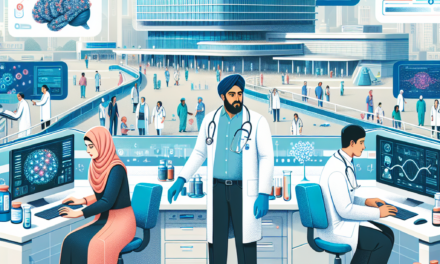Understanding Agentic AI and Its Applications in Healthcare
Artificial Intelligence (AI) has made significant strides in various sectors, and one of the most promising areas is healthcare. Among the different types of AI, Agentic AI stands out due to its ability to act autonomously and make decisions based on data. This article delves into the concept of Agentic AI, its applications in healthcare, and the implications for patients, providers, and the healthcare system as a whole.
What is Agentic AI?
Agentic AI refers to AI systems that possess the capability to act independently and make decisions without human intervention. Unlike traditional AI, which primarily focuses on data analysis and pattern recognition, Agentic AI can engage in complex decision-making processes, often mimicking human-like reasoning. This section explores the foundational concepts of Agentic AI, its characteristics, and how it differs from other forms of AI.
Defining Characteristics of Agentic AI
Agentic AI is characterized by several key features that distinguish it from other AI systems:
- Autonomy: Agentic AI can operate independently, making decisions based on its programming and the data it processes.
- Adaptability: These systems can learn from new data and experiences, allowing them to improve their decision-making over time.
- Goal-Oriented Behavior: Agentic AI is designed to achieve specific objectives, whether that be improving patient outcomes or optimizing resource allocation.
- Interactivity: These systems can interact with users and other systems, facilitating communication and collaboration.
- Context Awareness: Agentic AI can understand and respond to the context in which it operates, making it more effective in dynamic environments.
How Agentic AI Differs from Traditional AI
While traditional AI systems are often limited to data processing and analysis, Agentic AI takes a step further by incorporating decision-making capabilities. Traditional AI can assist healthcare professionals by providing insights based on historical data, but it lacks the ability to act on those insights autonomously. In contrast, Agentic AI can:
- Make real-time decisions based on incoming data.
- Implement treatment plans without human oversight.
- Adjust its actions based on patient responses and outcomes.
This distinction is crucial in healthcare, where timely and accurate decision-making can significantly impact patient outcomes.
Applications of Agentic AI in Healthcare
Agentic AI has a wide range of applications in healthcare, from diagnostics to treatment planning and patient management. This section explores five key areas where Agentic AI is making a significant impact.
1. Diagnostic Assistance
One of the most promising applications of Agentic AI is in diagnostic assistance. AI systems can analyze medical images, lab results, and patient histories to identify potential health issues more accurately and quickly than human practitioners.
For instance, a study published in the journal Nature demonstrated that an AI system could diagnose breast cancer from mammograms with an accuracy comparable to that of expert radiologists. The AI was trained on thousands of mammogram images, allowing it to recognize patterns that may be indicative of cancer.
Moreover, Agentic AI can assist in diagnosing rare diseases by cross-referencing symptoms and genetic data against vast databases. This capability is particularly valuable in cases where human experts may have limited experience or knowledge.
2. Personalized Treatment Plans
Agentic AI can also play a crucial role in developing personalized treatment plans for patients. By analyzing a patient’s genetic makeup, medical history, and lifestyle factors, AI systems can recommend tailored treatment options that are more likely to be effective.
For example, IBM’s Watson for Oncology uses natural language processing and machine learning to analyze patient data and medical literature. It can suggest treatment options based on the latest research and clinical guidelines, helping oncologists make informed decisions.
This personalized approach not only improves patient outcomes but also enhances the efficiency of healthcare delivery by reducing trial-and-error in treatment selection.
3. Predictive Analytics for Patient Management
Predictive analytics powered by Agentic AI can significantly enhance patient management by identifying individuals at risk of developing certain conditions. By analyzing historical data and identifying risk factors, AI systems can alert healthcare providers to intervene early.
For instance, a study published in the journal Health Affairs found that an AI model could predict hospital readmissions for heart failure patients with an accuracy of over 80%. By identifying patients at high risk of readmission, healthcare providers can implement targeted interventions to improve outcomes and reduce costs.
4. Workflow Optimization
Agentic AI can streamline healthcare workflows by automating routine tasks and optimizing resource allocation. This capability allows healthcare providers to focus on patient care rather than administrative burdens.
For example, AI systems can automate appointment scheduling, patient triage, and billing processes. By analyzing patient data and operational metrics, these systems can identify inefficiencies and recommend improvements, ultimately enhancing the overall patient experience.
5. Remote Monitoring and Telehealth
With the rise of telehealth, Agentic AI has become increasingly important in remote patient monitoring. AI systems can analyze data from wearable devices and mobile health applications to monitor patients’ health in real-time.
For instance, AI algorithms can track vital signs, medication adherence, and lifestyle changes, alerting healthcare providers to any concerning trends. This proactive approach enables timely interventions and reduces the need for in-person visits, making healthcare more accessible and efficient.
Challenges and Ethical Considerations
While the potential of Agentic AI in healthcare is immense, several challenges and ethical considerations must be addressed. This section explores the key issues surrounding the implementation of Agentic AI in healthcare.
Data Privacy and Security
One of the primary concerns with Agentic AI is the handling of sensitive patient data. Healthcare organizations must ensure that AI systems comply with regulations such as the Health Insurance Portability and Accountability Act (HIPAA) in the United States, which mandates strict data privacy and security measures.
Moreover, the use of AI systems raises questions about data ownership and consent. Patients must be informed about how their data will be used and have the right to opt-out of data sharing if they choose.
Bias and Fairness
AI systems are only as good as the data they are trained on. If the training data is biased or unrepresentative, the AI may produce skewed results that could adversely affect certain patient populations. For example, an AI system trained primarily on data from one demographic group may not perform well for patients from different backgrounds.
To mitigate bias, healthcare organizations must ensure that their AI systems are trained on diverse datasets and regularly audited for fairness. This process is crucial to avoid perpetuating existing health disparities.
Accountability and Liability
As AI systems take on more decision-making responsibilities, questions of accountability and liability arise. If an AI system makes a mistake that leads to patient harm, who is responsible? Is it the healthcare provider, the AI developer, or the organization that implemented the system?
Establishing clear guidelines for accountability is essential to ensure that patients receive safe and effective care while fostering trust in AI technologies.
Integration with Human Providers
While Agentic AI can enhance decision-making, it is not a replacement for human healthcare providers. The integration of AI into clinical workflows must be done thoughtfully to ensure that healthcare professionals can effectively collaborate with AI systems.
Training healthcare providers to work alongside AI technologies is crucial for maximizing their benefits. This includes understanding the limitations of AI and knowing when to rely on human judgment.
Regulatory Challenges
The rapid advancement of AI technologies has outpaced regulatory frameworks in many regions. Policymakers must develop guidelines that ensure the safe and effective use of Agentic AI in healthcare while fostering innovation.
Regulatory bodies must work closely with healthcare organizations and AI developers to create standards that address safety, efficacy, and ethical considerations. This collaboration is essential for building public trust in AI technologies.
The Future of Agentic AI in Healthcare
The future of Agentic AI in healthcare is promising, with the potential to revolutionize patient care and improve outcomes. As technology continues to evolve, several trends are likely to shape the landscape of Agentic AI in healthcare.
Increased Collaboration Between AI and Healthcare Professionals
As healthcare providers become more familiar with AI technologies, we can expect increased collaboration between AI systems and human professionals. This partnership will enhance decision-making and improve patient care by combining the strengths of both parties.
For example, AI can provide real-time data analysis and recommendations, while healthcare providers can apply their clinical expertise and empathy to make final decisions. This collaborative approach will lead to more informed and holistic patient care.
Advancements in Natural Language Processing
Natural Language Processing (NLP) is a critical component of Agentic AI, enabling systems to understand and interpret human language. As NLP technology advances, we can expect AI systems to become more adept at understanding complex medical terminology and patient narratives.
This improvement will facilitate better communication between patients and AI systems, allowing for more accurate assessments and recommendations. For instance, AI chatbots could provide patients with personalized health information based on their symptoms and medical history.
Integration of AI with Genomic Data
The integration of AI with genomic data holds immense potential for personalized medicine. As genomic sequencing becomes more accessible, AI systems can analyze genetic information alongside clinical data to identify tailored treatment options for patients.
This approach could lead to breakthroughs in treating complex diseases such as cancer, where genetic factors play a significant role in treatment efficacy. By leveraging AI to analyze genomic data, healthcare providers can make more informed decisions about targeted therapies.
Expansion of Telehealth Services
The COVID-19 pandemic accelerated the adoption of telehealth services, and this trend is likely to continue. Agentic AI will play a crucial role in enhancing telehealth by providing real-time monitoring and decision support for remote patients.
As telehealth becomes more integrated into healthcare delivery, AI systems will help ensure that patients receive timely interventions and personalized care, regardless of their location.
Ethical Frameworks and Guidelines
As the use of Agentic AI in healthcare expands, the development of ethical frameworks and guidelines will be essential. Policymakers, healthcare organizations, and AI developers must collaborate to establish standards that prioritize patient safety, data privacy, and fairness.
These frameworks will help guide the responsible implementation of AI technologies in healthcare, ensuring that they are used to enhance patient care while addressing ethical concerns.
Conclusion
Agentic AI represents a transformative force in healthcare, with the potential to enhance diagnostics, personalize treatment, and optimize patient management. However, the successful integration of Agentic AI into healthcare systems requires careful consideration of ethical challenges, data privacy, and the need for collaboration between AI and human providers.
As we move forward, it is crucial to foster an environment that encourages innovation while prioritizing patient safety and equity. By addressing the challenges and embracing the opportunities presented by Agentic AI, we can pave the way for a more efficient, effective, and patient-centered healthcare system.
In summary, understanding Agentic AI and its applications in healthcare is essential for stakeholders across the industry. By leveraging the strengths of AI technologies while addressing ethical considerations, we can unlock the full potential of Agentic AI to improve patient outcomes and revolutionize healthcare delivery.




